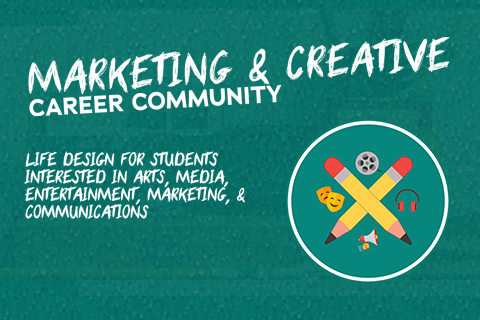Explore a career in Production, Sound, Animation, Distribution and Publicity.
Film, television, media, and other related entertainment careers focus on the creation and distribution of content through radio, film, cable, online, and streaming services.
These include areas such as:
- Production: directing, casting, and coordination
- Set production, on-set subfields like camera, lighting, sound, electrical, and wardrobe
- Animation, digital and graphic arts
- Post-production and editing
- Content delivery (radio, television, and online),
- Distribution (streaming, DVD, and other mediums),
- Publicity and advertising,
- Account management
Opportunities also exist on the creative side (writing, acting) and the business side (accounting, finance, and human resources). Be sure to check out our Performing Arts section and the Consulting, Finance, Operations, and Sales Career Community for information on those fields.
Employment Opportunities
Those interested in exploring the entertainment field should seek out internship opportunities within film studios, broadcasting and television companies, and distribution agencies. Many entertainment companies rely on interns to assist with all areas of the business, and while unpaid internships are very common, there are also strong, paid internship programs that rotate students through various elements of the entertainment business. Roles also exist within communications firms that develop for TV, radio, and online platforms. See our Marketing, Advertising and PR section for more on those industries.
For production candidates, it is important to develop a portfolio of your work, including clips, storyboards, and final products. This can be a combination of static work (in a pdf) and visual and multimedia options displayed through a Vimeo or YouTube channel. Creating your own website or online portfolio to showcase your work is also encouraged.
-
Successful candidates have:
- Knowledge of the entertainment industry and current trends
- Interest in television/film/media/pop culture
- Ability to work independently
- Ability to express oneself succinctly both in person and in writing
- Strong interpersonal skills to work well with directors, editors, producers, business and marketing roles, and specialist technicians
- Flexibility to deal with production delays, unexpected problems and varied personality types
- Ability to remain calm and confident in high-stress or crisis situations
- Willingness to work long hours on assignments with tight timelines
- A commitment to high-quality work and to continuing to improve your own skills and knowledge
-
Hiring cycle:
- Internship Cycle – summer internship programs hire in February/March/April
- Job Cycle – rotational and page programs February/March, on-demand and production April through summer
- Freelance Work – it is quite common in the entertainment industry to freelance – something that usually starts part-time and could expanded to full-time. Being a field that is highly dependent on who you know, students should build their portfolios and make connections with professionals. In addition to their artistic skills, freelancers must also build business knowledge as they are, technically, running their own small business. Knowledge of business types, budgeting, marketing, and contracts can ensure that you are properly set up and can claim things appropriately on taxes. Without belonging to a large organization, freelancers also need to turn to other groups, such as unions, for things such as health insurance and retirement options.








